
The newsletter of UCL Library Services Issue 14: Autumn 2004
News items:
|
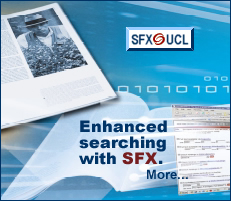 |
Lost in a maze of electronic resources?
Frustrated by the time taken to reach full text online?
Looking for a single list of all possible locations for an item?
SFX is the answer!
It is now quicker and easier to use a wide range of electronic resources in
your research or study, thanks to SFX, the linking facility introduced by Library
Services in September 2004.
You will start to see the  button appearing in databases such as: button appearing in databases such as:
- eUCLid, the UCL Library Catalogue;
-
Web of Knowledge;
-
Medline; and many other subject-specific bibliographic databases
Wherever you see the  button next to a reference, you can click for direct
access to: button next to a reference, you can click for direct
access to:
- Full-text of electronic journals
-
Full-text of electronic books
-
An instant search for the item on another library catalogue.
The button opens a menu of options, looking something like this: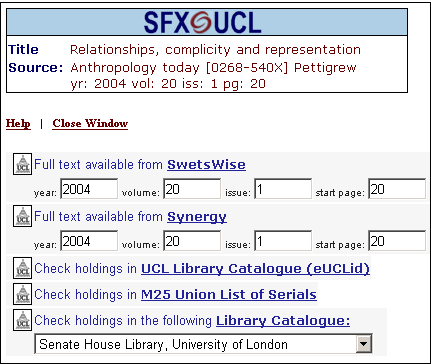
You will see the full citation of the book or article at the top of the menu,
followed by a number of links.
Clicking on one of these links opens a new Web browser window containing the
full text or catalogue search of your choice.
The exact options on the menu are:
- Dynamically generated
-
Relevant to your search
-
Specific to UCL
Therefore you will not see exactly the same menu for each item, but only those
links which are appropriate.
You will be able to link more seamlessly from one resource to another, and
to view all your options in a single list. This will save you time and enable
you to use alternatives if one route is unavailable.
Note that those electronic journals which are only licensed for computers
on the UCL network will only appear in the menu if you are using SFX on campus.
Usual password-controlled off-campus access to certain electronic journals
also applies.
For more information, pick up a leaflet from a Library Services enquiry desk
or visit the following page on the Library Services website: http://www.ucl.ac.uk/Library/sfx.shtml.
Margaret Flett, Assistant Librarian (IT Services)
The Library at UCL’s Department of Human Communication Science (HCS),
due to its unique specialist collections, also serves as the UK’s National
Information 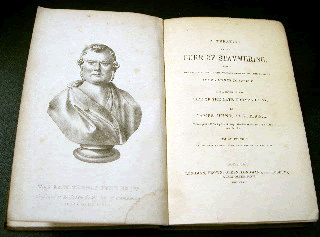 Centre for Speech-language Therapy (NICeST). Over the last decade,
librarians and other staff members in the Department have been collecting historical
material relating to speech and language, with a view to creating the UK’s
first historical collection in this relatively new subject area. Centre for Speech-language Therapy (NICeST). Over the last decade,
librarians and other staff members in the Department have been collecting historical
material relating to speech and language, with a view to creating the UK’s
first historical collection in this relatively new subject area.
Over the years a great deal of work has been undertaken to assemble this collection,
mostly by the former HCS Librarian, Angela Douglas, in collaboration with Professor
Joy Stackhouse. Thanks to donations from pioneering speech therapists, now
in retirement, and from organisations like the Friends of the Children of Great
Ormond Street Library, the Collection continued to grow over several years
until it occupied much of the Library’s store cupboard.
However, the Collection languished in this store cupboard for several more
years. Having collected the materials, the Library lacked the resources to
do anything more with them until, in 2002, a project was established jointly
by the Wellcome Trust and the British Library, who invited institutions to
bid for grants to maintain Collections in the History of Medicine. A joint
bid by UCL, co-ordinated by Anne Chesher was successful and at last the Collection
could come out into the open.
In August 2002, Maria Cotera was employed as the project cataloguer for the
HCS materials. Maria worked over the next 12 months sorting out the collection,
discarding duplicates, and entering each item on the Library’s online
catalogue. This included the painstaking cataloguing of hundreds of obscure
pamphlets and journal offprints. A year later the project was complete. Altogether
1508 monographs, pamphlets, conference proceedings and even a 1963 vinyl LP
have been catalogued. The books were carefully labelled by a team of library
assistants led by Sharon James and are now displayed in an elegant wooden cabinet
in HCS Library. They appear on the eUCLid Library catalogue with the location “Hist.Coll.” All
items are for use in the Library only, and non-members of UCL may consult the
Collection by arrangement with the HCS Librarian.
This project has enabled UCL to uncover a unique resource for anyone with
an interest in the history of speech and language therapy. Treasures in the
collection 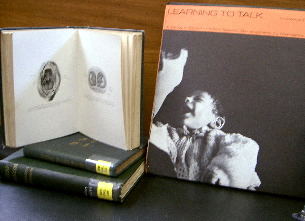 include a 1905 edition of Helen Keller’s autobiography, The
Story of My Life; James Hunt’s A treatise on the Cure of Stammering from
1857; papers from eminent speech therapists and an 1880 edition of Gray’s
Anatomy. Some of these documents provide fascinating insights into the prevailing
attitudes of their time. One such example is the following theory proposed
by Hunt for the relative rarity of stuttering in women: include a 1905 edition of Helen Keller’s autobiography, The
Story of My Life; James Hunt’s A treatise on the Cure of Stammering from
1857; papers from eminent speech therapists and an 1880 edition of Gray’s
Anatomy. Some of these documents provide fascinating insights into the prevailing
attitudes of their time. One such example is the following theory proposed
by Hunt for the relative rarity of stuttering in women:
“The fair sex should, from their natural bashfulness, be more liable
to it ... [but] nature, in order to compensate woman for her weakness, has
bestowed upon her a powerful weapon in the gift of the tongue ... the vocal
and articulating apparatus of woman being more elastic and mobile than that
of man, is less liable to be affected by some of the causes which produce the
infirmity in the male sex”.
It is reassuring to note that opinion among the (now very much female-led)
speech therapy profession has changed somewhat since Hunt’s treatise
was published!
Stevie Russell, HCS Librarian August 2004.
With special thanks to Annabelle Chan, Anne Chesher, Maria Cotera, Angela
Douglas, and Sharon James.
 Top of page Top of page
Library Services has taken up the gauntlet of online learning via UCL's Virtual Learning Environment (VLE), 'WebCT'. VLEs offer a new way of teaching library information skills and resources to a wide range of users.
The first two subjects to take advantage of this provision are
Anthropology and Geography, with course modules created by Kirtsie Preest and
Katherine Roberts. The Geography project has been running for the last year
and has successfully embedded self-paced information skills and resources training
within the department's curriculum. Two of the modules were also offered to
Anthroplogy students as part of the department's methods course.
Library Services is also involved with a number of other WebCT
projects. A tutorial has been created for generic information skills for all
students. This comes from a SCILTA (Sub Committee on Innovations in Teaching
Learning and Assessment) funded, multi-departmental group involving staff from
Library Services, SLAIS (School of Librarianship, Archive & Information Studies),
Information Systems, EPD (Education and Professional Development) and the Electronic
Engineering department. Specialised training for staff and students of the
Royal Free and University College Medical School is also available via modules
created by the Medical Librarians Team and enabled on WebCT by Jane Falconer.
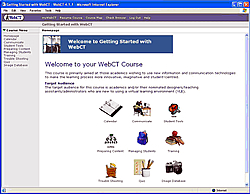 |
There are many advantages of using online learning in this way:
- It eases the burden of teaching large groups about information resources and specific databases;
- It provides online help and advice 24 hours a day;
- The workshop sessions allow help to be individually tailored where necessary;
- It allows links to pre-existing documentation and important web links;
- The pages containing the courses are easy to maintain and design using standard Dreamweaver software;
- It makes it possible to include interactive quizzes to allow users to assess their knowledge themselves.
|
The overall response from student evaluation forms has been
very positive. These forms showed that most students prefer the delivery of
information skills training online as its easy to use, flexible, they can access
the resource in their own time and it provides a useful reference tool for
the future. The evaluations also showed that the students want the online courses
to be intersting with screen captures and worked examples so they see how to
use the different databases.
What next? The aim is to look at the evaluation forms and make
improvements to the design and layout, incorporate self-test quizzes and include
a glossary of library and information terminology. If you are interested in
setting up your own online course then please contact Learning Technology Support
Services (LTSS) at ltss@ucl.ac.uk or see their webpage at www.ucl.ac.uk/learningtechnology.
Kirstie Preest, Anthropology and Geography Subject Librarian & Deborah Furness, Head of Enquiry Services
The work of improving access to the Main Library will start in the week of 20
December 2004, with completion expected in September 2005. The work will replace
the existing entrance with a new staircase and lift, and will see the creation
of a membership and general enquiries desk at ground floor level. Also, access
control turnstiles, similar to those in the Science Library, and dedicated disabled
access will be installed.
While work on the creation of a new entrance to the Main Library is underway,
a temporary entrance, via the stairs at the north end of the cloisters, will
be in use from 22 December 2004. Library Attendants will be on duty at the temporary
entrance to assist Gallery visitors and Library users. Disabled access will continue,
as at present, via the South Junction lift.
It is anticipated that the Library will function normally throughout the building
works. There may be noise disruption, especially near the beginning of the project,
but there will be no noisy work after 14:00 during the demolition phase. All
work will cease during the third term (1 April 2005 to 10 June 2005), to ensure
a quiet examination period. Further details of the plans can be found at http://www.ucl.ac.uk/Library/wilkins/.
Spring 2004 saw the launch of a package of new Subject
web pages from
Library Services. The web pages, of which there are over 50, are intended to
serve as introductory guides to each of the Library's discrete subject collections.
Produced by the Subject Librarians across library sites and faculties, the
pages contain inciteful introductions to UCL's printed and electronic collections
readily available from one central prominent point on the Library's
home page.
Each subject page follows a template, ensuring that standard
help and information is accessible across disciplines, and comprises sections
describing:
- Printed collections (books, journals, classification schemes)
- Electronic collections (databases, e-books, e-journals and web resources)
- Other libraries (important external collections and access details)
- Contact details (to facilitate communication between users and Subject Librarians)
The pages aim to make it easier for library users to negotiate
UCL's extensive research collections, and are an important contribution towards
Library Services' Mission Statement objectives to "act as a gateway to both
printed and electronic resources in an integrated way" and to "enable all library
users to acquire and practise excellent information seeking and retreival skills".
Understanding the various subject resources available and how best to exploit
them is vital to academic success. New users should explore their relevant
subject pages as an introductory grounding, while the more experienced may
appreciate a refresher and some pointers towards up-to-the-minute web and other
electronic resources.
Katherine Roberts
Senior Library Assistant, Subject Librarians Group
 Top of page Top of page
Last modified 17 January 2005
|

